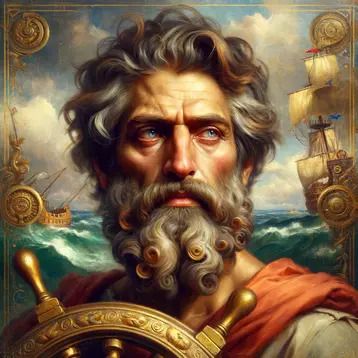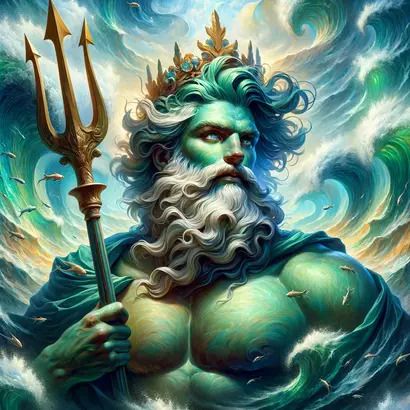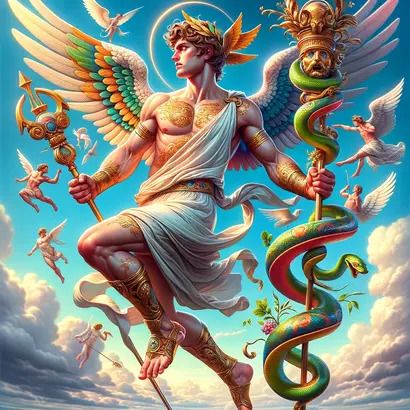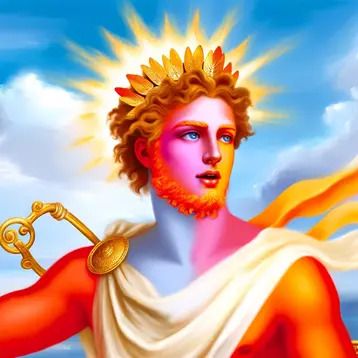
Odysseus
Odysseus :: The Trickster Hero
Odysseus was a legendary hero in Greek mythology, king of the island of Ithaca and the main protagonist of Homer's epic, the “Odyssey.” The son of Laertes and Anticlea, Odysseus was well known among the Greeks as a most eloquent speaker, an ingenious and cunning trickster. One of the suitors of Helen, Odysseus was obliged to join the Trojan expedition – something he didn’t want to, since he was more than happy alongside his wife, Penelope, and his newborn son, Telemachus, and he knew from a prophecy that if he goes to Troy, it will take him a long time to come back home. So, he tried feigning madness, but Palamedes exposed him, and Odysseus had no choice but to leave. He played a crucial part during the Trojan War – both as a strategist and as a warrior – eventually coming up with the famous stratagem which decided the outcome of the bloody conflict: the Trojan Horse. Afterward, he set sail for Ithaca, but, after blinding his son, the Cyclops Polyphemus, he angered Poseidon so much that the sea god did whatever he could to obstruct Odysseus’ journey homeward. After numerous memorable adventures – Circe, the Sirens, Scylla and Charybdis, the Laestrygonians, Calypso – Odysseus finally managed to reach Ithaca, ten years after leaving Troy and twenty after joining the Trojan expedition. There, he reunited with Telemachus and Penelope and, after killing all of his wife’s Suitors, reclaimed his throne. He died an old man, probably accidentally killed by Telegonus, a child he had fathered with Circe during one of his many adventures.
Odysseus Before the Trojan War
Odysseus’ Family
Odysseus was – almost certainly – the only son of Laertes of Ithaca, a former Argonaut, and Anticlea, the only daughter of Autolycus. Now, this Autolycus, Odysseus’ grandfather, was a son of Hermes and was widely renowned as so skillful a thief that he could not be caught, being “able to change whatever he stole into some other form – from white to black, or from black to white, from a hornless animal to a horned one, or from horned one to a hornless.” However, later authors didn’t seem too content with a genealogy which makes the cunning Odysseus a relative of a thief only on his mother’s side, so they started spreading a rumor according to which his father wasn’t Laertes, but none other than the master-trickster Sisyphus, who supposedly bargained a night with Anticlea from her father after he had finally caught Autolycus stealing his cattle.
Odysseus’ Name
Odysseus seems to have spent some of the most defining moments of his childhood with Autolycus, who, in addition to passing on to him his craft, may have even given Odysseus his famous name. “Inasmuch as I am come hither as one that has been angered with many” – supposedly said Autolycus upon being asked to be the godfather, “therefore let the name by which the child is named be Odysseus.” By this etymology, Odysseus comes from odussesthai, “to be wrought against, to be at odds with someone, to hate.”
Odysseus’ Scar
Many years later, while visiting his grandfather, Odysseus joined his uncles on a boar-hunting trip and, even though he was still an inexperienced adolescent, he managed to kill the boar himself, after coming face to face with it. However, the boar did hurt him, leaving a deep recognizable scar on his leg, one which will play an important part in the memorable drama of his later life.
A Suitor of Helen
Odysseus was one of the suitors of Helen, step-daughter of King Tyndareus of Sparta. However, he was undoubtedly the most reluctant among them, not only because he was reasonably sure that Menelaus would be the chosen bridegroom, but also because, as beautiful as Helen was, he was much more profoundly smitten by her cousin, Penelope, the daughter of Tyndareus’ brother, Icarius.
With or without Odysseus, the suitors were just too many to please, and Tyndareus justifiably feared an outbreak of violence regardless of his final choice. Fortunately, Odysseus thought up an excellent little solution. In exchange for some help from Tyndareus regarding the hand of Penelope, Odysseus advised him to make all the suitors swear an oath that they would respect his final choice and that they would support the husband and wife in any ill fate that the two may face in the future.
And so, when Menelaus was chosen, all the other suitors peacefully left Sparta; except for Odysseus, that is, who stayed there until Tyndareus fulfilled his part of the promise and talked his brother into giving Penelope’s hand to Odysseus in marriage.
Palamedes’ Ploy
After marrying Penelope, Odysseus took her to Ithaca where the couple lived a happy life, made even happier after the birth of their only son, Telemachus. However, while the boy was still a baby, Helen was abducted by Prince Paris of Troy. Calling upon the oath sworn by Helen’s suitors, Menelaus summoned all of them to help him in his quest to bring her back. Ironically – since he had been the one to propose the oath in the first place – Odysseus did not want to join the expedition; and he had a good reason for it: the seer Halitherses had informed him that if he participated, it would take him a long time to return home. So, he decided to feign madness by harnessing a donkey and an ox to a plow and sowing salt on a field. Palamedes – who was the man sent to recruit Odysseus from Ithaca – did not believe the hero one bit; in order to test his sanity, he put Telemachus in front of the plow. Odysseus immediately changed course, thus exposing his plan. Odysseus never forgave Palamedes for this and spend many an hour planning his revenge.
Odysseus During the Trojan War
It would be an understatement to say that the successful recruitment of Odysseus was a crucial event, one that would eventually decide the outcome of the Trojan War perhaps more than any other: without Odysseus, the Greeks may have never sacked Troy.
Recruiting Achilles
As a matter of fact, his recruitment started paying dividends even before the Greeks reached Troy. Namely, fearing a prophecy which claimed that Achilles would either live a long and peaceful life or die a glorious death as a mighty warrior, his mother Thetis decided to disguise him as a woman and hide him on the court of King Lycomedes, who ruled with the island of Scyros. Unfortunately, Odysseus learned from the prophet Calchas that the Greeks could win the Trojan War only if Achilles joined their forces. So, after learning of his whereabouts, he devised a plan to penetrate Achilles’ disguise as well. Masked as a peddler selling women’s clothes, Odysseus laid a spear among his goods, and Achilles (named Pyrrha at the time) was the only one who showed any interest in the shiny object. Some are more inclined to tell a different story, according to which Odysseus feigned an attack on Scyros; in this case, all but Achilles fled upon hearing the sound of the battle horn.
Odysseus’ Role in the Trojan War
From a discussion between Priam and Helen in Homer’s “Iliad,” we know that Odysseus was shorter by a head than Agamemnon but broader in his chest and shoulders. Physically unimpressive, “thou wouldest have deemed him a churlish man and naught but a fool” on sight, claims Priam. “But whenso he uttered his great voice from his chest, and words fell like snowflakes on a winter's day, then could no mortal man beside vie with Odysseus; then did we not so marvel to behold Odysseus' aspect.” “He knoweth all manner of craft and cunning devices,” concurs Helen, this illustrious “Odysseus of many wiles.”
Unsurprisingly, Odysseus’ main role during the Trojan war was one of a crafty strategist and a wise advisor. He was the one most capable of maintaining the morale of the Greeks at a high level, and the one who managed to prevent the bulk of the Greek army from withdrawing from the war after Agamemnon’s plan to test their determination by allowing them a leave had backfired tremendously. Odysseus was also the leader of the three-man expedition sent to appease Achilles who, enraged at what he had perceived as unfair treatment from Agamemnon, decided to leave the battlefield.
However, this doesn’t mean that Odysseus didn’t prove his worth as a warrior as well. Together with Diomedes, he captured and killed the Trojan spy Dolon and killed the Thracian king Rhesus during a dangerous night-raid on the Trojan camp. He also captured the Trojan seer Helenus in order to learn from him a few conditions upon whose fulfillment the fall of Troy depended. These included the recruitment of Achilles’ son, Neoptolemus, and the wounded archer, Philoctetes (in whose possession were Heracles’ bow and arrows) – and Odysseus played the central part in both.
Odysseus and The Trojan Horse
Odysseus’ main and most memorable contribution to the successful conclusion of the Trojan War was the devising of the stratagem by which, after a decade-long war, the Greeks finally managed to enter Troy. It involved the construction of the Trojan Horse, a huge wooden sculpture inside whose hollow belly the greatest of Greece’s celebrated heroes hid. After leaving the Horse near the Gates of Troy, the Greeks pretended to sail away; initially confused, in time, the Trojans started believing that the war was over and that the Horse had been a divine gift; so, they wheeled the sculpture inside their city gates. They spent the whole day joyfully celebrating their victory and dancing around the Horse. However, once the night fell, the Greek warriors hopped out of the sculpture and opened the Gates for the rest of the rest of the Greeks, who, under the guise of the evening, had managed to sail back to the shore. Before long, the Greeks stormed at the unsuspecting, drunk and practically defenseless Trojans, slewing many of them and, finally, winning a famous and conclusive victory.
Odysseus’ Cruelty
Odysseus was sometimes unreasonably cruel towards his enemies, which is why, as much as he was adored by the Greeks, he was reviled by the Romans (who knew him as Ulysses and considered themselves Trojan descendants). Certainly, Odysseus’ most vicious act happened just after Troy had fallen: fearing some kind of future retribution, he urged for the death of Astyanax, Hector’s little boy. Some even say that it was Odysseus himself who killed Astyanax, possibly throwing the infant from Troy’s walls.
In addition, Odysseus never forgot his grudge against Palamedes. According to some authors, he faked a letter from Priam and falsely exposed him as a traitor after which he and Diomedes stoned Palamedes to death. Others claim that the two comrades fooled Palamedes into descending a well under the premise that a treasure laid hidden inside; once Palamedes climbed down the well, Odysseus and Palamedes started throwing rocks at him, eventually burying him at the bottom.
The Odyssey: Returning Home to Ithaca
After the Trojan War, Odysseus embarked on a ten-year journey to reach his home, Ithaca; his adventures are recounted – mostly in flashbacks – in Homer’s monumental epic “Odyssey.” Chronologically, this is the order in which they happen.
Maron and the Cicones
Odysseus left Troy with twelve ships – as many as he had sailed with a decade before. Soon after, a strong wind drives the ships off course, and they wind up on the south coast of Thrace, among the Cicones, Trojan allies. In the battle which ensues, Odysseus and his crew kill all the men there, except for a priest of Apollo called Maron. In gratitude, the priest gives Odysseus twelve jars of strong wine. Drunk with victory, the Greeks stay a tad too long in Thrace, giving the Cicones just enough time to summon the necessary reinforcements and eventually prevail, overpowering Odysseus’ crew and killing six men out of each of the twelve ships in the process.
The Lotus-Eaters
After some time, Odysseus reaches the land of the Lotus-Eaters. He sends three men to scout the area, but, not one of them returns to the ships in due time. As Odysseus finds out, the reason for this is not some cruel act by the Lotus-Eaters, but the taste of their lotus, “so delicious that those who ate of it left off caring about home, and did not even want to go back and say what had happened to them, but were for staying and munching lotus with the Lotus-Eaters without thinking further of their homecoming.” Odysseus has to drag his scouts back to the ships by force, after which the journey to Ithaca goes on.
Odysseus and Polyphemus
Next, Odysseus' ships reach the island of the Cyclopes, a race of one-eyed giant shepherds famous for their uncouth and violent ways. Enticed by some resources, Odysseus and twelve of his men end up entrapped in the cave of the Cyclops Polyphemus, who, after blocking the entrance of the cave with a giant boulder, starts eating them, two by two. The monster manages to devour six of Odysseus’ men before the hero devises a life-saving trick. After introducing himself as Outis – i.e., “Nobody” – he gives Polyphemus some of Maron’s wine and gets him so drunk that he is able to pierce his eye with a stake. “Nobody is killing me by fraud,” cries out Polyphemus, “Nobody is killing me by force!” Though not exactly the sharpest tools in the shed, nobody can blame the other Cyclopes this time around for not running to Polyphemus’ help.
The next morning, Odysseus and his six surviving men escape from Polyphemus’ cave by hiding under the bellies of his sheep, as the Cyclops unsuspectingly lets them out to pasture. Before they sail away from the island, however, Odysseus makes the mistake of revealing his true identity to Polyphemus, who then asks his father, the sea-god Poseidon, to avenge him; this will have a major impact on the hero's journey, as it will be Poseidon’s anger which will keep Odysseus away from his beloved Ithaca for the next ten years.
Odysseus and Aeolus
The ships then reach the island of the god of the winds, Aeolus, who welcomes them warmly and harbors them for a month. At the end of it, so as to aid Odysseus on his journey, Aeolus puts all his winds except for the West Wind in a leather bag and gives the bag to Odysseus. During the next nine days, the West Wind steers the ships gently all the way to Ithaca. However, on the tenth day, just before they reach the shore, Odysseus falls asleep. Thinking it contains gold, his men steal the leather bag and open it, thus releasing all the other winds at once. The ships are violently blown back to the island of Aeolus, where, realizing that Odysseus must be cursed, the god of the winds refuses to help him again.
The Laestrygonians
Seven days later, Odysseus reaches the island of the Laestrygonians, a tribe of bloodthirsty, man-eating giants. Flinging massive boulders at them and spearing the drowning man like fish, the Laestrygonians sink eleven of Odysseus’ ships and eat most of his sailors; in fact, Odysseus' ship is the only one which manages to escape, the members of its crew the only survivors of this dreadful adventure.
Odysseus and Circe
Odysseus’ ship next reaches Aeaea, an island ruled by the sorceress Circe. She turns some of Odysseus' men into pigs, but Odysseus, helped by Hermes who gives him a magical herb called moly, resists Circe’s witchcraft and attacks her with his sword. Overwhelmed by Odysseus’ courage and determination, Circe falls in love with him and agrees to transform the pigs back into men. After this, they stay on the island for one year, during which Odysseus becomes Circe’s lover.
The Underworld
At the end of the year, Circe counsels Odysseus to go down to Hades and seek some advice from the seer Teiresias before continuing his journey. Odysseus does, and, in the process, he not only learns some of the hardships which lie before him, but also encounters many famous dead people (Agamemnon, Achilles, Heracles), including his mother's spirit, who tells him to hurry back home, since his wife Penelope is surrounded by potential suitors. Back at Aeaea, Circe restates some of these prophecies and warns Odysseus of many more dangers which await him.
Odysseus and the Sirens
First, Odysseus passes by the island of the Sirens who – as he is told by Circe – enchant all who come near them through the luring sound of their song. However, Odysseus orders his crew to stuff their ears with beeswax and tights himself tightly to the mast, so that he can not only escape unharmed but also hear the beautiful Sirens’ song.
Scylla and Charybdis
Then Odysseus’ ship must pass through a narrow strait located between the whirlpool Charybdis and the six-headed monster Scylla. It does, but not before Scylla manages to devour six of Odysseus’ men.
The Cattle of Helios
Next, they reach the island of Thrinacia, where Odysseus, remembering Circe’s and Teiresias’ warnings, cautions his shipmates not to eat the sacred cattle of the sun god Helios. In his absence, however, they do, and Helios, enraged, demands from Zeus to punish them, or else he would take the sun with him to the Underworld. Zeus obliges and sends a violent storm during which all of Odysseus’ shipmates – but him – die.
Odysseus and Calypso
The sea carries Odysseus to the island of Ogygia, where the witch Calypso falls in love with him and keeps him captive for the next seven years. All the while, Odysseus dreams of his beloved Ithaca and not even the promise of immortality manages to change his mind. Finally, through the intervention of Zeus and Hermes, at the end of the seven years, Odysseus is released.
The Phaeacians
He then reaches Scheria, the island of the Phaeacians (the modern-day island of Corfu). There, during a feast, Odysseus recounts his awe-inspiring story. Happy to have had the honor to welcome such an honorable guest, the Phaeacians provide Odysseus with a ship and a couple of sailors, who pilot the exhausted hero to Ithaca. After twenty years of warring and wandering, Odysseus is finally back home.
Odysseus back in Ithaca
Odysseus reaches Ithaca late at night, sound asleep. Not wanting to bother his sleep, the Phaeacian sailors lay him down on the shore and leave. Odysseus wakes up confused, but Athena appears to him and, after revealing to him what had happened, disguises him as an elderly beggar – both for his safety and so that he can learn better what had happened during his absence.
Eumaeus
Pretending to be a Cretan returning from Troy with some news of Odysseus, the disguised hero finds his way to the hut of one of his most faithful servants, the swineherd Eumaeus. Eumaeus welcomes him warmly, all the while speaking in superlatives for his past master.
Odysseus and Telemachus
Meanwhile, Telemachus has sailed home from Sparta, and, after evading an ambush set by the Suitors of Penelope, disembarks on the coast and goes straight to Eumaeus’ hut. Odysseus makes himself known to him, and the father and son are finally reunited – twenty years after being separated by the Trojan War and the ploy of Palamedes.
Penelope and the Suitors
Accompanied by Eumaeus, Odysseus next heads for his own house. There, he is ridiculed by the Suitors, especially by Antinous, one of their two most prominent leaders, who even hurls a footstool at him and incites him to fight Irus, another beggar present at the palace. Suddenly, Penelope appears and, prompted by Athena, announces that she is finally ready to remarry. Happy to hear this – since it implies that Penelope has been faithful to him throughout all this time – Odysseus (still disguised) has a talk with his unsuspecting wife, during which Penelope is moved to tears to hear some (fake) news of Odysseus’ visit to Crete.
Odysseus and Eurycleia
Growing a fondness for this stranger, Penelope calls Eurycleia – Odysseus’ one-time wet-nurse – and asks her to wash the beggar’s feet. While doing this, Eurycleia notices a scar on his leg and realizes the identity of the stranger. She tries telling Penelope, but Odysseus and Athena intervene, and the secret stays safe.
The Contest
Urged by the beggar, Penelope announces the next morning that she would marry the Suitor able to string her husband's bow and then shoot an arrow through twelve ax shafts. None of the suitors manage to do it; Odysseus, still in disguise, completes the challenge and, afterward, reveals himself; helped by his son Telemachus and Athena, he slays all of the Suitors and hangs twelve of the household maids identified by Eurycleia as traitors.
The Reunion of Odysseus and Penelope
Eurycleia notifies Penelope of the unexpected outcome of the contest, joyously notifying her that the stranger had been none other than Odysseus all this time! Penelope does not believe her and refuses to acknowledge Odysseus’ identity even after coming down and seeing him bathed and clothed in royal attire, all but a god among humans. Understandably cautious, Penelope asks Odysseus to move her marriage-bed to another room. Odysseus replies that such a thing is impossible, as he had made the bed himself and knows that one of its legs is a still living olive tree deeply rooted in the ground. Penelope needs no further proof: she runs in her husband’s embrace, and both start weeping tears of joy. Gladdened, Athena orders Eos to postpone the dawn for a few hours, so that the two spouses can fully enjoy a lengthened night of embraces, tears and stories, of love and pleasure.
The Death of Odysseus
Not many things are known about Odysseus’ later years; or, to be more precise, too many contradictory stories are told by different authors. The more romantic state that he and Penelope lived happily ever after; the more skeptic that, after finding a proof of her infidelity, Odysseus either left or even killed Penelope and went on another journey to the kingdom of Thesprotia, where he eventually married Callidice.
The most famous story of Odysseus’ death, however, concerns Telegonus, the son he fathered with Circe while on Aeaea. Once Telegonus reached adulthood, he went to Ithaca to meet his father. Landing on the shore, he killed some sheep to satisfy his hunger. Odysseus was not happy with this act and came out to confront him. In the fight which ensued, Odysseus was deadly wounded by Telegonus’ spear tipped with the poison of a sting-ray. After finding out the identity of his victim, Telegonus took both Penelope and Telemachus to Aeaea, where Circe made all three of them immortal. Afterward, the two sons married each other's mothers.
Odysseus Sources
Though he appears as an important character in quite a few tragedies (such as, Euripides’ “Hecuba” and “The Trojan Women” or Sophocles’ “Ajax” and “Philoctetes”), the main sources on Odysseus’ life and deeds are, unsurprisingly, Homer’s two epics: the “Iliad,” which covers his partaking in the Trojan War, and, especially, the “Odyssey,” which focuses on his journey back home. A summary of the latter can be found in the final chapters of the epitome of Apollodorus’ “Library.”
See Also: Laertes, Anticlea, Trojan War, Helen, Tyndareus, Priam, Achilles, Thetis, Palamedes, Penelope, Polyphemus, Poseidon, Aeolus, Circe, Hermes, Helios, Zeus, Calypso, Telemachus, Telegonus
Odysseus Video
Odysseus Q&A
Link/Cite Odysseus Page
Written by: The Editors of GreekMythology.com. GreekMythology.com editors write, review and revise subject areas in which they have extensive knowledge based on their working experience or advanced studies.
For MLA style citation use: GreekMythology.com, The Editors of Website. "Odysseus". GreekMythology.com Website, 07 May. 2022, https://www.greekmythology.com/Myths/Heroes/Odysseus/odysseus.html. Accessed 26 April 2024.






